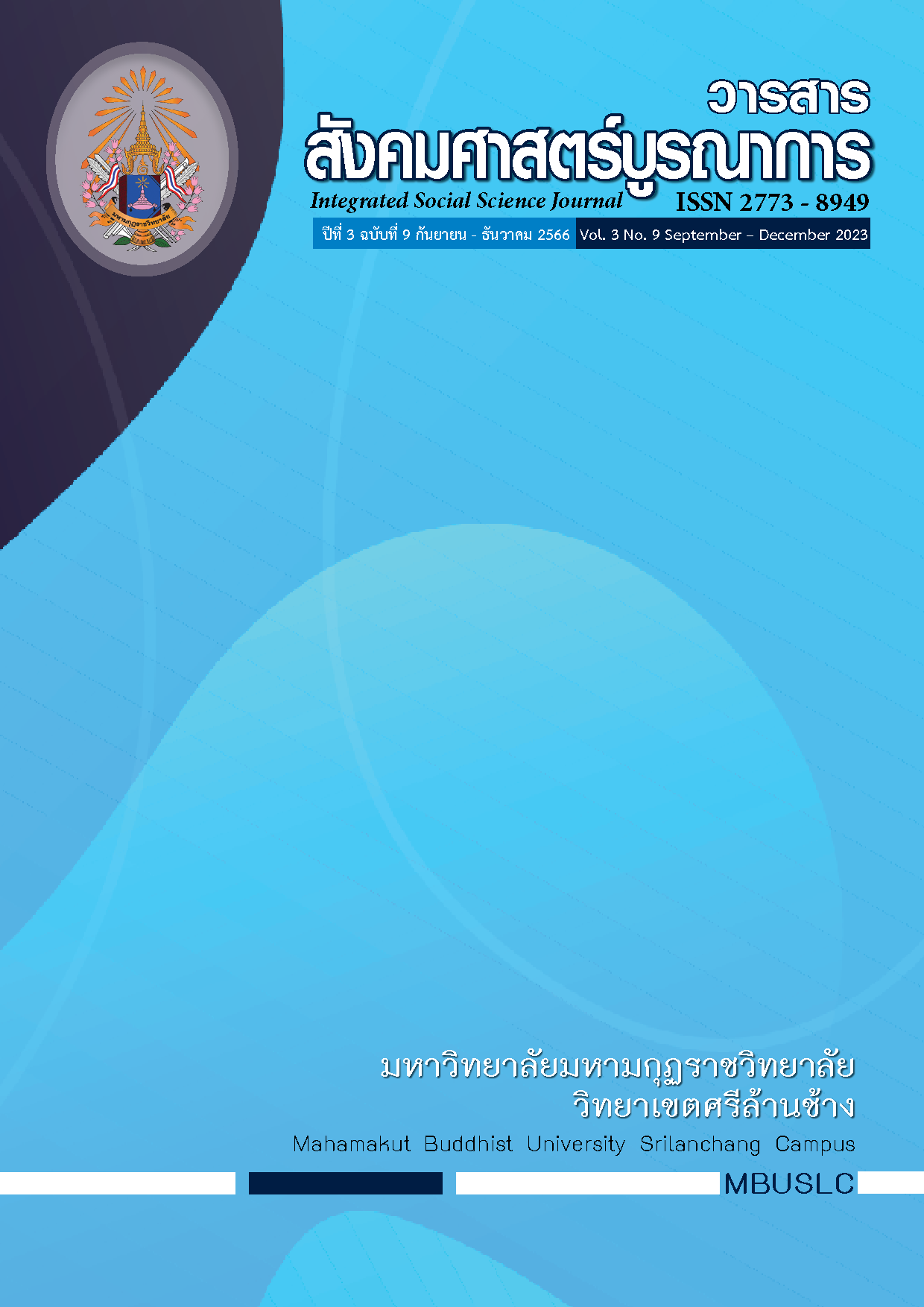THE GUIDELINES FOR DEVELOPING CORE COMPETENCIES IN THE DIGITAL AGE ACCORDING TO THE DUTIYAPĀPAṆIKA SUTTA PRINCIPLES OF EDUCATIONAL INSTITUTION ADMINISTRATORS UNDER THE OFFICE OF THE LOEI PRIMARY EDUCATIONAL SERVICE AREA OFFICE 2
Main Article Content
Abstract
The objectives of this research were (1) to study the conditions for developing core competencies in the digital age of educational institution administrators under the Office of the Loei Primary Educational Service Area Office 2, (2) to study the development of core competencies in the digital age according to the Dutiyapāpaṇika Sutta principles of educational institution administrators under the Office of the Loei Primary Educational Service Area Office 2, and (3) to study guidelines for developing core competencies in the digital age according to the Dutiyapāpaṇika Sutta principles of educational institution administrators under the Office of the Loei Primary Educational Service Area Office 2. The sample group used in this research included 302 participants, consisting of 274 teachers (90.73%) and 28 school administrators (9.27%). The statistics used for data analysis included frequency, percentage, mean, and standard deviation. The research results were as follows: 1. The development of core competencies in the digital age for educational institution administrators under the Office of the Loei Primary Educational Service Area 2 was rated as high overall. When considering individual aspects, the mean scores could be ranked from highest to lowest as follows: knowledge and skills in administration, innovation and technology, work expertise, teamwork, performance outcome-driven work, and leadership. 2. The development of core competencies in the digital age of educational institution administrators under the Office of the Loei Primary Educational Service Area 2 based on the Dutiyapapanika Sutta principles was generally at a high level. When considering each aspect separately, the mean scores could be ranked from highest to lowest as follows: Vidhūro aspect, Nissayasampanno aspect, and the Cakkhumā aspect. 3. The guidelines for developing core competencies in the digital age of educational institution administrators under the Office of the Loei Primary Educational Service Area 2 based on the Dutiyapāpaṇika Sutta principles revealed that the following findings from data synthesis through interviews: The Cakkhumā Aspect: this aspect encompasses performance-driven work, innovation, technology, and leadership. Administrators possess the ability to analyze, plan, set clear objectives, efficiently utilize technology to drive the organization and maintain flexible thinking per the context of work. The Vidhūro Aspect: this dimension includes expertise in work and knowledge and skills in management. Administrators pursue knowledge and engage in training to enhance their management skills, decision-making, and communication. They analyze data and employ academic knowledge to find suitable alternatives. The Nissayasampanno Aspect: this facet emphasizes teamwork, with administrators demonstrating interpersonal skills. They collaborate effectively to achieve organizational goals, fostering the development of knowledge, capabilities, and professional progress.
Article Details

This work is licensed under a Creative Commons Attribution-NonCommercial-NoDerivatives 4.0 International License.
บทความที่ได้รับการพิจารณาจากคณะกรรมการผู้ทรงคุณวุฒิและเผยแผ่ในวารสารฉบับนี้ เป็นทัศนคติและข้อคิดเห็นส่วนบุคคลของผู้เขียนแต่ละท่าน ไม่ถือว่าเป็นทัศนะคติและความรับผิดชอบ
ของบรรณาธิการ
บทความ ข้อมูล เนื้อหา รูปภาพ ฯลฯ ที่ได้รับการตีพิมพ์ในวารสารสังคมศาสตร์บูรณาการ ถือเป็นลิขสิทธิ์ของวารสารสังคมศาสตร์บูรณาการ หากบุคคลหรือหน่วยงานใดต้องการนำทั้งหมดหรือส่วนหนึ่งส่วนใดไปเผยแพร่ต่อหรือเพื่อกระทำการใด ๆ จะต้องได้รับอนุญาตเป็นลายลักอักษรจากวารสารสังคมศาสตร์บูรณาการ ก่อนเท่านั้น
References
ชนินทร์ ศรีส่อง และนิชยากานต์ เรืองสุวรรณ. (2564). แนวทางการพัฒนาสถานศึกษาในยุคดิจิทัล สังกัดสำนักงานเขตพื้นที่การศึกษามัธยมศึกษา เขต 27. การประชุมเชิงวารสารบัณฑิตศึกษา. 18(80). มกราคม-มีนาคม 2564. หน้า 56 – 57
เทื้อน ทองแก้ว. (2550). สมรรถนะ (Competency) : หลักการและแนวปฏิบัติ. กรุงเทพมหานคร: มหาวิทยาลัยราชภัฏสวนดุสิต
พรพิมล แก้วอ่อน. (2564). แนวทางการพัฒนาทักษะภาวะผู้นำในการรษที่ 21 ตามหลักทุติยปาปณิกสูตรของผู้บริหารโรงเรียนในกลุ่มโรงเรียนฟ้าอุดมสังกัดสำนักงานเขตพื้นที่การศึกษาประถมศึกษานครสวรรค์ เขต 3. วิทยานิพนธ์ ค.ม. (พุทธบริหารการศึกษา). พระนครศรีอยุธยา: บัณฑิทยาลัย มหาวิทยาลัยมหาจุฬาลงกรณราชวิทยาลัย
สำนักงานเขตพื้นที่การศึกษาประถมศึกษาเลย เขต 2. (2564). รายงานการประเมินตนเอง พ.ศ. 2564. เลย: สำนักงานเขตพื้นที่การศึกษาประถมศึกษาเลยเขต 2
สำนักงานคณะกรรมการพัฒนาเศรษฐกิจและสังคมแห่งชาติ. (2560, 2 กุมภาพันธ์). แผนพัฒนาเศรษฐกิจและสังคมแห่งชาติ ฉบับที่ 12 (พ.ศ. 2560-2564). ออนไลน์. สืบค้นเมื่อ 24 สิงหาคม 2565 แหล่งที่มา: https://www.nesdc.go.th/ewt_dl_link.php?nid=6422
สุกัญญา แช่มช้อย. (2563). การบริหารสถานศึกษาในยุคดิจิทัล (SCHOOL MANAGEMENT IN DIGITAL ERA). พิมพ์ครั้งที่ 1. กรุงเทพมหานคร: สำนักพิมพ์แห่งจุฬาลงกรณ์มหาวิทยาลัย
อาราฟัด หัดหนิ. (2562). สมรรถนะหลักของผู้บริหารโรงเรียนขนาดเล็ก สำนักงานเขตพื้นการศึกษา ประถมศึกษาสงขลา เขต 3. สารนิพนธ์ ศษ.ม. (การบริหารการศึกษา). สงขลา: บัณฑิตวิทยาลัย มหาวิทยาลัยหาดใหญ่
Cronbach, Lee J. (1971). Essentials of psychological testing. 4th ed. New York: Harper & Row 1971), p. 67,
Likert, R.A. (1961, May). Technique for the Measurement of Attitudes. Arch Psychological, 25(140), 1 – 55.
Krejcie, R.V., & Morgan, D.W. (1970). Determining Sample Size for Research Activities. Educational and Psychological Measurement, 30(3), 607 – 610.

